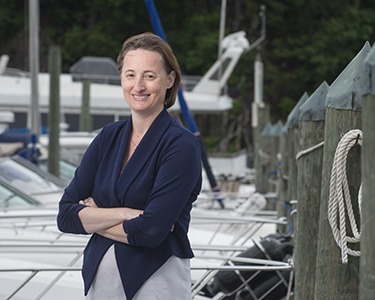“Engineering is a way of teaching people how to think about problems. I firmly believe that a good engineering program, like you see here at George Mason, is a great way to prepare students for a wide range of careers.”
— Leigh McCue, associate professor of mechanical engineering

Leigh McCue, an associate professor of mechanical engineering, is building a team of researchers who will work on a safety app for commercial fishermen.
Mason Engineering researcher Leigh McCue created an app that could be a lifesaver for commercial fishermen.
The profession is consistently rated the most dangerous job in the United States, says McCue, who joined the Department of Mechanical Engineering this semester as an associate professor. “They are risking their lives to put food on people’s plates.”
Her free app, SCRaMP (Small Craft Motion Program), gives fishermen insights into what’s going on with their vessels. “They know their boats well, but this tool can help empower them even more and improve their safety,” says McCue, an expert in ship dynamics and avid boater, with degrees in mechanical, aerospace, and naval engineering.
For the past three and a half years, she served as executive director of the American Society of Naval Engineers. Before that, she was an associate professor in Virginia Tech’s Department of Aerospace and Ocean Engineering.
She's in the process of building a research team at Mason to improve the app, as well as work on other maritime safety projects.
SCRaMP provides a warning system if a boat’s motion is getting dangerous. “It can help them detect if something has gone awry in the ship like icing or downflooding, which is when the ship takes on water from an open hatch cover or some damage from a rusty plate,” she says.
When fishermen are asleep, SCRaMP can track the movement of the ship and alert them if there is a problem. It’s useful to big vessels as well as small crafts.
“The idea is we are giving them output of accelerometer and gyroscope data and their location information—so they’ve got heading, latitude, longitude, and a compass rose, then we’ve added in some safety metrics to give them a real-time sense of what’s going on with their vessel.”
The National Science Foundation and the Office of Naval Research have funded her app-based safety interventions. She also has received support from Virginia Tech’s Occupational Safety and Health Research Center, and the Northeast Center for Occupational Health and Safety in Cooperstown, New York, and she’s writing proposals for grants to improve the tool.
Currently, she’s working with an epidemiologist at Johns Hopkins to gather honest input from fishermen on to improve SCRaMP.
“When I’m walking dockside and sticking a phone in somebody’s hands and saying, ‘tell me what you think of this app,’ fishermen are more prone to being positive,” McCue says. “I saw chivalry in the fishing industry. They might tell me what they disliked, but as soon I gave them a paper survey, they’re nice about what they were saying.”
It’s heartening to see that some want to probe the depths of her work, she says. A few years ago, McCue, who owns a motorboat, met a fisherman at a conference in Kodiak, Alaska. He said he’d buy her a beer if she explained the math behind ship stability.
“We ended up doodling stability curves on the back of a coaster. He even took the coaster home with him to study further.”
Oscar Barton Jr., a professor and chairman of mechanical engineering, says McCue is a welcome addition to the growing department. “She brings unique leadership skills, strength as a researcher, and talent as an educator to help build our department.
“She created a research enterprise and achieved tenure. Her research expenditures totaled just over $3.51 million. Her teaching portfolio includes both undergraduate and graduate courses,” Barton says.
McCue returned to academia after her time with the American Society of Naval Engineers because “I found myself missing teaching, missing being a practicing engineer, and missing doing research.”
She enjoys the passion of her students. “The energy that sophomores bring is exciting. You can see the enthusiasm as they’re getting their first experience in engineering.”
“Engineering is a way of teaching people how to think about problems,” she says. “I firmly believe that a good engineering program, like you see here at George Mason, is a great way to prepare students for a wide range of careers.”
